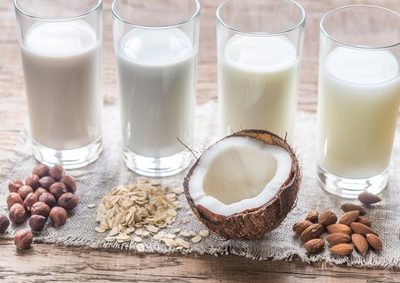GUEST POST: The Scoop on Milks
by Sandra Mikhail – Tuesday, 5. June 2018
The topic of “dairy alternatives” continues to inundate the media, where cow’s milk has been demonised enough to scare the public, the health conscious and food bloggers near and far! I won’t be addressing my thoughts and the facts on dairy but rather give some insight to the alternatives out there should you choose to replace cow’s milk for medical reasons, personal preference or if you’re simply eager to join yet again, another trend…
Regardless of where you live, you have surely come across the milk isle where the simple act of picking up a carton of milk is a thing of the past. We’ve now got the choice of rice, almond, soy, oat, coconut, hemp and definitely more nut varieties awaiting to be milked! Allergies and intolerances are the most common reasons why people would go dairy free but we’ve also got those who choose to follow a vegan lifestyle and others who are concerned about the potential administration of hormones and antibiotics to cattle.
If you are avoiding cow’s milk, here are my top 3 alternatives and tips to make sure that you continue to provide your body with the right mix of nutrients you may miss out on when eliminating dairy:
Soy Milk
Perhaps the most controversial of all milks, soy milk is the most recognisable and widely used dairy-free milk. In terms of nutritional value, soy milk closely resembles cow’s milk where it serves as an excellent source of complete plant-based protein with a mix nutrients normally added to the milk such as calcium, B12, and vitamin D.
The negative stigma associated with soy milk is mainly due to the presence of phytoestrogens in soy and their presumed association with cancer. To set the record straight – phytoestrogens in soy have actually shown a protective effect against certain cancers in a large number of studies while others showed no association. So to this date, soy consumption does not cause cancer.
Moving on to “man boobs”…Yes, many have claimed that soy consumption in men can have a feminising effect but my dear lads, rest assured that studies have not shown such an association. If this theory were true, a large percentage of men would be in need of good boob support where soy is a major staple in their culture.
Oat Milk
Oat milk is another type of dairy-alternative that has been appearing more and more in recipes and households. Oat milk has a mild and slightly sweet flavour and in my opinion, the next best option after soy in terms on nutritional profile. Depending on the brand, calcium and vitamin D may be added to the milk (well, this would be the preferred choice actually) but it does have a good amount of protein as well as fibre. Oat milk contains a type of fibre called beta-glucan that has been linked to reducing cholesterol levels. It may, however, not be suitable for those on a gluten free diet and is also considered a high carbohydrate choice.
Rice Milk/Almond Milk
Now, the main reason I am mentioning those two alternatives together is that generally speaking, they do not possess the most favourable nutrient profile but are extremely popular. Rice milk is the most hypoallergenic milk out there. It has a watery consistency and can be quite sweet due to its high carbohydrate content. If rice milk is your alternative of choice then make sure it is fortified with calcium, vitamin D and B12 and is unsweetened.
Almond milk is another alternative with a low protein content and is not suitable for those with a nut allergy. However, some brands have gone the extra mile of adding pea protein to their almond milks to boost its protein content . Almond milk is a low calorie option that needs a whole lot of added vitamins and minerals to improve its nutritional profile. It is a big hit though due to its pleasant, nutty taste and have personally used it in baking and on cereals with a yummy result. Be sure to choose the unsweetened varieties as they can be loaded with all that extra sugar!
So, here you go folks! For those who have asked me about my milk of choice, I normally alternate between lactose free 1.5% cow’s milk, soy milk and Alpro’s Coconut/Rice milk – not too energy dense from the coconut as it is diluted with rice milk yet packs the right amount of flavour.
Sandra Mikhail is an internationally-known accredited practising dietitian, a nutrition blogger as well as the founder of Nutrition A-Z and co-founder of The Wellbeing Hub. She holds a Bachelor of Nutrition and Dietetics (Monash University, Australia), a Master of Advanced Studies in Nutrition and Health (ETHZ) and is a member of the Dietitians Association of Australia. Sandra will soon add an additional qualification to her portfolio as she is currently part of the International Olympics Committee Sports Nutrition Program. Being a globe-trotting dietitian, she has extensive experience in clinical practice, nutrition consulting and health promotion, working in Australia, the UAE and Switzerland. Her main areas of specialty include digestive disease, sports nutrition, food allergies and intolerances as well as weight management and works with popular brands and selected partners such as FCZ, Roots, Lululemon, Balboa and Simply Soup here in Zurich.





Meet the New Faces Behind Our Power Team
/in Health, Lifestyle, Living in Zug, Living in Zurich, Power/by Casey3 Ways to Push Through a Tough Workout
/in Health, Lifestyle, Living in Zug, Living in Zurich, Power, Rides/by CaseyMeet Your New Power Coach, Julia
/in Health, Lifestyle, Living in Zug, Living in Zurich, Power, Rides/by Casey